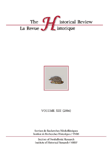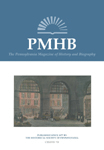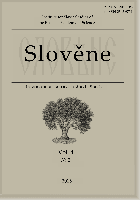
Novyi Istoricheskii Vestnik-The New Historical Bulletin
metrics 2024
Bridging Past and Present with Rigorous Academic Dialogue.
Introduction
Novyi Istoricheskii Vestnik - The New Historical Bulletin, published by IZDATEL STVO IPPOLITOVA, stands as a significant academic platform in the field of history, particularly within the Russian context. With an ISSN of 2072-9286 and established in 2012, this journal aims to foster rigorous scholarship and innovative research in historical studies, enhancing discourse amongst historians, researchers, and students alike. Although it currently holds a Q3 ranking in the Arts and Humanities - History category, its commitment to showcasing diverse historical narratives and promoting academic dialogue positions it as a noteworthy contributor to the field. The journal's scope covers a wide array of historical topics, encouraging submissions that illuminate various aspects of the past, whilst also serving as a vital resource for those seeking to understand contemporary historical discourse. As an open access journal, it promotes the accessibility of scholarly work, appealing to a broad audience intent on expanding their knowledge of history.
Metrics 2024
 0.11
0.11 -
- 0.10
0.10 4
4Metrics History
Rank 2024
Scopus
IF (Web Of Science)
JCI (Web Of Science)
Quartile History
Similar Journals

Estudos Historicos
Championing High-Quality Research in History and Literature.Estudos Historicos, an esteemed academic journal published by FUNDACAO GETULIO VARGAS-FGV, is a pivotal platform for scholars in the fields of History, Cultural Studies, and Literature. With a focus on contemporary historical discourse and interdisciplinary approaches, this Open Access journal has been fostering scholarly dialogue since 2009, ensuring that vital research is accessible to a global audience. Based in Brazil, it holds impressive rankings, notably within the top tier of the Scopus database, where it is positioned in the 88th percentile for Literature and Literary Theory and the 75th percentile for History. The journal also boasts a Q1 categorization in Literature and Literary Theory, reflecting its commitment to high-quality scholarship. With its comprehensive scope, Estudos Historicos plays a crucial role in shaping the understanding of historical contexts and cultural narratives, appealing to researchers, professionals, and students alike who seek to explore the intersections of history, society, and literature.

HISTORISCHES JAHRBUCH
Fostering Insightful Historical Discourse.HISTORISCHES JAHRBUCH is a notable German academic journal published by VERLAG KARL ALBER, dedicated to the field of history. With a rich tradition that began in 1941, this journal serves as a platform for scholarly research, exploring various historical themes and methodologies. Although specific impact factors are not readily available, its categorization as Q4 in History indicates its role in the wider academic discourse. HISTORISCHES JAHRBUCH is primarily accessible through subscription, reflecting its commitment to traditional publishing while providing valuable insights for historians, researchers, and students. The journal's coverage, which has converged over selected years including 1980, discontinuing in Scopus, highlights its shifting focus and the evolving landscape of historical study. As a contributing member to the historical scholarship community, HISTORISCHES JAHRBUCH continues to enrich the understanding of historical narratives and foster academic exploration.

RIVISTA STORICA ITALIANA
Exploring the Depths of Italian Historical NarrativesRIVISTA STORICA ITALIANA, published by EDIZIONI SCIENTIFICHE ITALIANE, is a prestigious journal dedicated to the field of history, particularly focusing on Italian historical studies. Established to promote scholarly dialogue, it serves as a vital resource for researchers, professionals, and students passionate about understanding Italy's rich historical narrative. With a Q4 classification in the 2023 category for History and a ranking of #762 out of 1599 in Scopus, this journal occupies a significant position within the academic landscape. Although it does not currently offer an open access model, the journal maintains a valuable portfolio of articles published continuously from 1973 to 2021, providing insights that contribute to ongoing historical debates. The RIVISTA STORICA ITALIANA is essential for those looking to engage with both traditional and contemporary historical discourses, and it remains a cornerstone for historical scholarship in Italy.

Rossiiskaya Istoriya
Unraveling the Complex Narratives of RussiaRossiiskaya Istoriya is a distinguished academic journal published by ROSSIISKAYA AKAD NAUK, IZDATELSTVO NAUKA, focusing on the rich tapestry of Russian history, sociology, and political science. With an ISSN of 0869-5687, this journal serves to illuminate critical historical narratives and contemporary societal issues within the Russian context. While it currently does not offer open access options, its insights are pivotal for researchers, professionals, and students keen on exploring the dynamics of Russian society and its historical developments. The journal has been recognized in the Q3 and Q4 quartiles for History and Sociology, respectively, in 2023, highlighting its contribution to academic discourse. Although the journal's coverage in Scopus has been discontinued, its ranking demonstrates a significant presence in the Arts and Humanities (Rank #1056) and Social Sciences categories (Rank #1267). The editorial team strives to present high-quality scholarly articles that not only reflect upon the past but also engage with pressing contemporary issues, making it an essential resource for anyone looking to deepen their understanding of the intricate interplay between history and social sciences in Russia.

Historical Review-La Revue Historique
Bridging Eras Through Scholarly Dialogue.Historical Review-La Revue Historique, published by the NATL HELLENIC RES FOUNDATION, is a premier open-access journal focusing on the multifaceted field of history. Established in 2004 and operating out of Greece, this journal serves as a platform for the dissemination of scholarly research, critical essays, and innovative perspectives on historical events, figures, and themes. Though it has transitioned through different stages in its indexing, including a hiatus from Scopus coverage between 2009 to 2021, it has successfully maintained its presence in the academic community, evidenced by its current Q4 classification in the history category of Arts and Humanities. With an ISSN of 1790-3572 and an E-ISSN of 1791-7603, the journal continues to foster rich academic dialogue and inquiry, making research accessible to a wider audience. As a valuable resource for researchers, educators, and students, Historical Review-La Revue Historique contributes significantly to the understanding and appreciation of historical narratives and methodologies.

Vestnik Tomskogo Gosudarstvennogo Universiteta Istoriya-Tomsk State University Journal of History
Advancing Historical Insights from Siberia and BeyondVestnik Tomskogo Gosudarstvennogo Universiteta Istoriya - Tomsk State University Journal of History is a prominent academic journal that focuses on advancing the field of historical studies with a particular emphasis on Russian and Siberian historiography. Published by TOMSK STATE UNIVERSITY, this journal aims to provide a platform for the dissemination of innovative research, critical analyses, and scholarly discussions among historians, researchers, and students. With its ISSN 1998-8613 and E-ISSN 2311-2387, the journal is committed to fostering an accessible scholarly community, although it currently does not operate under an Open Access model. By featuring works that engage with various narratives and methodologies, Vestnik Tomskogo Gosudarstvennogo Universiteta Istoriya plays a vital role in enriching academic dialogue and contributing to the ever-evolving understanding of historical contexts, particularly in relation to regional studies. This journal is an essential resource for anyone interested in delving into the complexities of history, culture, and society.

PENNSYLVANIA MAGAZINE OF HISTORY AND BIOGRAPHY
Exploring the Intersection of History and Biography in PennsylvaniaPennsylvania Magazine of History and Biography, published by University of Pennsylvania Press, is a prominent scholarly journal dedicated to the exploration and examination of historical narratives and biography with a focus on the state of Pennsylvania. Established as a key resource in the field of history, this journal is distinguished by its commitment to interdisciplinary research and its role in fostering scholarly discourse. With an ISSN of 0031-4587 and an E-ISSN of 2169-8546, the journal is indexed in respected databases, although it maintains a Q4 quartile rank in History according to the 2023 category quartiles. It stands as a valuable platform for researchers and historians, offering insights that illuminate the rich tapestry of Pennsylvania's past and its impact on broader historical trends. The journal is accessible through various platforms, ensuring that contemporary scholars can engage with its content even as it continues to evolve, reflecting the changing dynamics of historical study. As it has been in circulation since 1951, with converged formats from several years through 2024, this magazine remains a cornerstone for those seeking comprehensive studies that integrate local history within wider national narratives.

Slovene-International Journal of Slavic Studies
Bridging Disciplines in Slavic Cultural ExplorationThe Slovene-International Journal of Slavic Studies, published by the Russian Academy of Sciences, Institute of Slavic Studies, serves as a vital platform for scholarly discourse in the fields of Cultural Studies, History, Linguistics, and Religious Studies. Since its transition to Open Access in 2012, the journal has enriched academic dialogue, enabling wider circulation and accessibility of research findings. Based in the Russian Federation, the journal supports interdisciplinary approaches, inviting contributions that push the boundaries of traditional Slavic studies. With a commendable ranking in the Q3 quartile across multiple categories as of 2023 and respectable Scopus rankings, it stands out as a crucial resource for researchers and students alike, enhancing their understanding of Slavic and related cultural contexts. The journal's commitment to fostering international collaboration and dialogue positions it as an invaluable asset for anyone engaged in the complexities of Slavic studies.

Anos 90
Advancing Understanding of Brazil's Transformative 1990s.Anos 90 is a distinguished journal dedicated to the exploration of historical narratives and cultural phenomena, particularly within the context of Brazil during the tumultuous decade of the 1990s. Published by the Universidade Federal do Rio Grande do Sul as part of its Programa de Pós-Graduação em História, this open access journal has been a vital platform for scholars since 1993, encouraging the dissemination and discussion of historical research that contributes to the understanding of contemporary societal evolution. With an ISSN of 1983-201X and an E-ISSN of 0104-236X, the journal is committed to providing accessible scholarly content to a global audience, thus fostering collaborative research opportunities and academic dialogue. Despite being ranked in the fourth quartile for the History category as of 2023, Anos 90 remains an essential resource for researchers and students seeking in-depth insights into historical interpretation and analysis. The journal serves as a critical juncture for the academic community interested in delving into the complexities of a pivotal era in Brazilian history, making it a significant addition to the field of historical study.

Radovi-Zavoda za Hrvatsku Povijest
Exploring the Depths of Croatian HistoriographyRadovi-Zavoda za Hrvatsku Povijest, published by the Institute of Croatian History within the Faculty of Humanities and Social Sciences, is a distinguished open-access journal dedicated to advancing scholarly discourse in the field of history, with a specific focus on Croatian heritage and historiography. Established in 1971, this journal has evolved to become a vital resource for researchers, professionals, and students alike, showcasing innovative research and critical perspectives on historical developments in Croatia and the broader region. With an ISSN of 0353-295X and a recent Scopus ranking placing it in the Q3 quartile for 2023, it stands as a testament to the rich historiographical contributions emerging from Croatia. By providing immediate open access to its content, Radovi-Zavoda za Hrvatsku Povijest seeks to enhance the visibility and impact of historical research, facilitating knowledge exchange and academic collaboration. The journal's commitment to excellence is reflected in its rigorous peer-review process, ensuring that all published works meet high academic standards. As the journal continues to converge from 2013 to 2023, it solidifies its role as a key player in the global historical narrative.